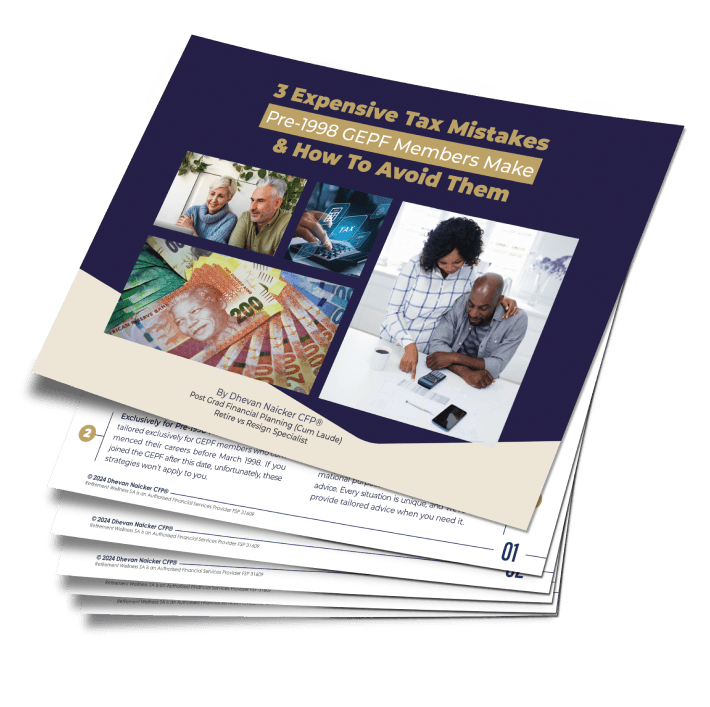Have you ever wondered why some government employees thrive in retirement while others struggle to make ends meet?
If you’re a government employee planning to retire—or debating between retiring or resigning—this guide is for you. Today, we’ll uncover the five top mistakes government employees make when they choose retirement.
Why is this important?
Because you have one chance to get it right. Instead of risking your financial future, wouldn’t it be better to learn from the costly mistakes others have made and avoid them?
Let’s dive into the five pitfalls so you can make an informed decision.
1. Not Factoring in the Penalty for Early Retirement
Your pension statement may not always show the full picture. Let me explain:
- Your figures are accurate only if you retire at the “normal retirement age“ of 60 (as per fund rules).
- If you retire before 60, your benefits will be reduced by a penalty. This adjustment is based on your age at the time of retirement.
Example:
Let’s say your pension statement shows a monthly income of R30,000, assuming retirement at 60. However, if you retire at 56, this figure could drop to R25,000 due to penalties.
How to Avoid This Mistake:
Carefully read the fine print on your pension statement. If you’re unsure, consult a financial specialist to understand how penalties could impact your retirement income.
2. Lack of Proper Tax Planning
Did you know that your retirement benefits are taxed differently depending on how you access them?
Your monthly pension and lump sum gratuity are predetermined by the fund, and taxes are applied accordingly. However, there are ways to minimize your tax burden:
Tax-Saving Techniques:
- Retirement Annuity Optimization: Consider how withdrawing from an RA impacts your tax bracket.
- Strategic Financial Structuring: Use other financial instruments like savings accounts to create liquidity while reducing tax obligations.
Why This Matters:
Without proper tax planning, you could lose a significant portion of your retirement benefits to unnecessary taxes.
3. Lack of Control Over Your Money
Once you retire, the income and benefits provided by the fund are fixed. Unlike resigning, you:
- Cannot adjust your monthly pension.
- Must manage your lump sum gratuity with discipline to avoid running out of funds.
What You Need to Do:
- Budget Carefully: Allocate your gratuity wisely for debt repayment, emergencies, or lifestyle expenses (e.g., holidays or home renovations).
- Plan for Longevity: Ensure your money lasts throughout retirement by creating a financial plan that accounts for inflation and future needs.
4. Overlooking Legacy Planning
Many retirees assume their pension fund will sufficiently support their loved ones after they pass. However, here’s the reality:
- If your children are financially independent and more than five years have passed since retirement, your fund benefits may not pass to them.
Solutions for Legacy Planning:
- Life Cover Policies: Set up a policy with clear beneficiaries (e.g., spouse or children).
- Draft and Regularly Update Your Will: Ensure it reflects your current wishes.
Consider Estate Taxes: Work with an advisor to plan for any inheritance taxes or costs that may arise.
By preparing in advance, you can leave a legacy for your family while ensuring a smooth transition after your passing.
5. Failing to Compare Retirement and Resignation
Making a rushed decision without exploring all your options can have lifelong consequences.
When you retire, your choice is final. You can’t go back and change your mind. On the other hand, resigning may provide more flexibility with your funds, allowing you to:
- Invest the lump sum for higher returns.
- Customize how and when you withdraw your money.
How to Compare the Two:
- Assess your income needs and how each option meets them.
- Evaluate the tax implications for both retirement and resignation.
- Factor in medical aid, leave payouts, and investment opportunities.
No Excuses: Get Expert Guidance Today
I understand how overwhelming this process can feel, which is why I’ve created the Retire vs Resign Masterclass.
It’s a free, step-by-step guide to help you:
- Understand the differences between retiring and resigning.
- Compare all your options confidently.
- Make the best choice for your financial future.
Take Control of Your Future
You only get one chance to make the right decision. Don’t leave it to chance. Register for the masterclass today and empower yourself with the knowledge to succeed.
Your Turn
Let me know in the comments:
- Which of these five mistakes do you think government employees make most often?
- Are there any challenges you’ve faced or insights you’d like to share?
Found this helpful? Give it a thumbs up to inspire more content like this.
I’ll see you in the next blog post!
Disclaimer: Retirement Wellness SA is an Authorised Financial Services Provider – FSP 31609. The information provided here is not offered by or on behalf of the Government Employees Pension Fund.

